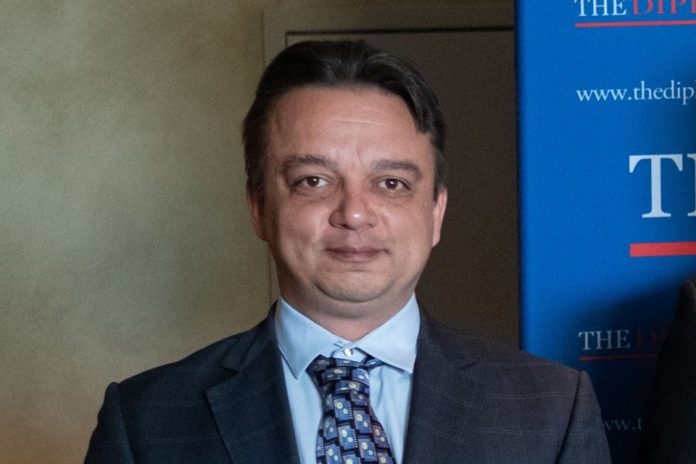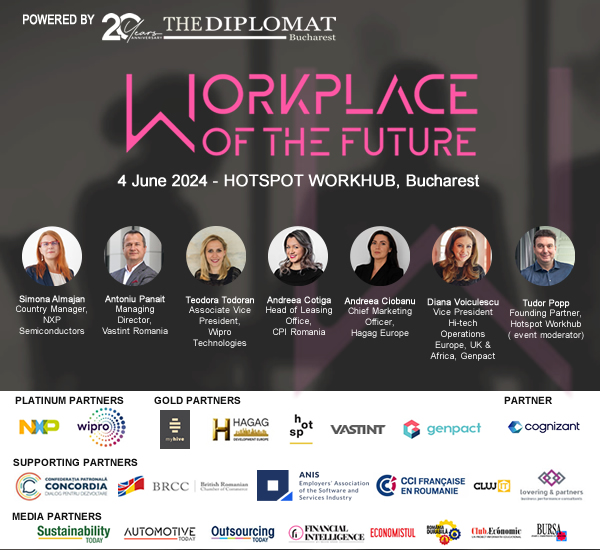“Romania must integrate circularity in its economical DNA to matter as a rising economy – our current advance will not last for decades from now if we are still on the take-make-waste obsolete model.
Circular Economy needs to be stimulated, not only because it is green and the entire world is already doing it, but because it constitutes a real economic, environmental, and social advancement,” Alexandru Laibar, Executive Director, Circular Economy Coalition (CERC) told Sustainability Today.
“Eco-design should become the main driver of change for businesses and authorities. A business can thrive by shifting its focus on providing more services and added value, instead of just increasing its number of products. Authorities can tackle it by promoting more the green public acquisitions in the public sector, not only by words, but by action and setting up an example in the entire society.”
How can Romania accelerate its transition to a circular economy? Why is this important for the country?
There are many ways of accelerating a transition, to anything: legally, market driven, socially or politically enabled. In this case, of the circular economy in our country, one can see that fairly progress has been made, considering all of the ways stated above.
We have now a strategy adopted by the Romanian Government and waiting for the corresponding action plan to push things forward, by involving all the stakeholders but, this is not going to be enough.
From the legislative side we need quick reactions and adoption of all the European documents concerning this, and the executive must act accordingly, at all levels.
The private sector, which I am representing within Circular Economy Coalition – CERC, is very active and perfectly understands that is not only a question of competitiveness, but of survival, for reasons that we will further discuss.
Romania must integrate circularity in its economical DNA to matter as a rising economy – our current advance will not last for decades from now if we are still on the take-make-waste obsolete model.
What are the current challenges for Romania to increase its degree of circularity? In your perspective, which should be the focus of Romanian authorities regarding the circular economy?
Main challenge is law enforcement – we have so many laws, and institutions to use them to create a safe and predictable business environment. Let’s just do that, for a start, and then we can complain about disparities and self-contradictory laws.
Circular Economy needs to be stimulated, not only because it is green and the entire world is already doing it, but because it constitutes a real economic, environmental, and social advancement.
Stimulus can be not only on taxation and investment, as we are deemed to judge from our current linear economic model but can also be on the social perspective – education matters, and so does the community participation – these are different facets of the same rough diamond that we are required to cut and polish fast, as the carbon must be contained inside.
What are the initiatives of the Circular Economy Coalition – CERC, to improve Romania’s circular economy?
Until recently, in our country the circular economy was mainly associated with recycling, which is not wrong, but it is totally insufficient, recycling being only a stage, one of the possibilities to solve a problem.
At CERC, we try to bring to the attention of public opinion other important topics, like eco-design, repair and reuse of products, new business models based on the concept of “product as a service” (the user does not necessarily have to own a product, but to be able to pay only for its use – the bicycles for rent in the city, and in the near future, probably also the payment for a number of washes of a washing machine, not for the object itself, which will belong to the manufacturer, and which can be upgraded, repaired and/or remanufactured by them when needed).
The Association became the main voice in Romania advocating for the principles of the Circular Economy and for the best international practices in the field, becoming, therefore, a key player for the domestic business community – more than 60 company-members, but also the voice that transmits internationally the proposals and Romanian achievements in this sector.
We are making studies, like the Deposit Retorn System (DRS), together with partners like Bucharest Academy of Economic Studies, and others, that constituted the base for drafting new legislation, also we did work on EN 50614:2020 – standard on preparation for reuse of electrical and electronic equipment, that was transposed into legislation by Law 42/2023 on the approval of the preparation procedure for the reuse of waste electrical and electronic equipment, the technical requirements regarding the preparation for reuse and the requirements for reporting and monitoring of reused electrical and electronic equipment – an important step in creating a fair market for second-hand EEE.
On the large scale, we have tried to address the problem of increased carbon emissions and have created the first personal carbon footprint calculator, adapted to the socio-economic realities in Romania, available here, free of charge, to anyone who wants to know and be aware of their own impact on the environment. The CO2 calculator was received with great interest by the public, and we hope that it will trigger not only personal reflection, but also the understanding of the importance of measurement – in business, as in life!
Also on the educational side, in a more professional and academic way, CERC members and specialists are supporting the Bucharest Academy of Economic Studies in the development of an MA with circular economy specifics – Sustainable Development of Businesses and Economic Organizations, the first in the Romanian academic environment that started in the fall of 2022, at the Faculty of Agricultural and Environment Economics.
What kind of policies and initiatives should be tackled more to generate the strongest impact in terms of reducing waste and creating a stronger green environment?
Eco-design should become the main driver of change for businesses and authorities. A business can thrive by shifting its focus on providing more services and added value, instead of just increasing its number of products. Authorities can tackle it by promoting more the green public acquisitions in the public sector, not only by words, but by action and setting up an example in the entire society.
Also, the eco-modulation – a principle of taxation that empowers the companies to gear up and do business like in the 21st century, by optimizing their products according to eco-design principles, must be immediately put into action.
What are the priorities and objectives for the Circular Economy Coalition in 2023 and in the short term?
Since 2017 and up to now we are aiming to the same objective – to circularize Romania’s economy and to decarbonize it. During this interval we have noticed that change comes gradually, and it is a working-progress on all our public policy initiatives and other projects.
As we were among the first in Romania to talk about eco-design on a professional level, we endeavour to open new discussions on repaired products (with companies like Klap, TIN Factory and GreenWEEE) and also on new types of packaging, either reusable (like the ones advocated for by CHEP and IFCO) or bio-degradable/compostable (produced, for example, by Bio Deck).
Green public acquisitions are a topic on our agenda, as much as there are the competition issues that are arising in this quest to make our economy more resilient and greener.
What are your main concerns for the foreseeable future?
Resource limitations and severe climate change require us to move from a take-produce-throw away consumption model to a completely circular economy by 2050.
All sectors are important and will have to make this transition, from the linear economic model to the circular one. Using the most important factor for measuring the climate impact, because this is what we are talking about with these global goals, 2030, 2050, and I am referring to GHG emissions, obviously the key sectors, which must be decarbonized quickly, are the energy sector (includes buildings, transport and industries) responsible for 73.2% of GHG and agriculture (includes land and forest exploitation) – which is responsible for 18.4% of GHG, to which are added other industrial processes – 5.2% and waste 3.2%, according to Climate Watch – the World Research Institute (2020).
What message would you like to convey to the stakeholders regarding the circular economy transition?
We can no longer talk about “transition”, we must talk about “adoption” and/or “transformation”.
The time of early adopters has not passed yet for all the sectors, but the entire world is moving faster than we anticipated ten years ago, and in directions that we can only hope we will be able to anticipate correctly and act accordingly.
Short message, without hesitation or false modesty, is clear for me: become circular or retire, because if you (your company) don’t do it, for sure somebody else that you might not even know about it, will do it instead and will flourish.




